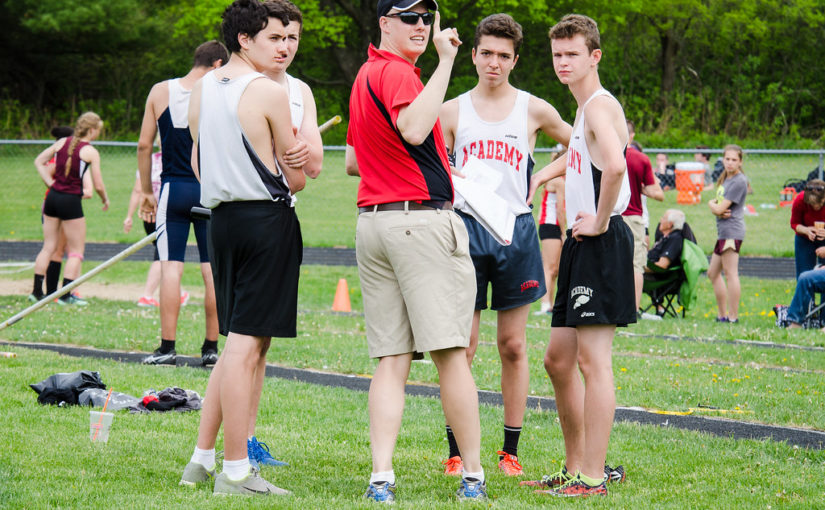Benefits of individual postseason meetings
“To be a good leader, you have to listen,” said veteran Indiana Tech baseball coach Kip McWilliams, who led his team to the 2019 NAIA World Series and was named ABCA Regional Coach of the Year.
One of the most important times for McWilliams to listen to his players is during the postseason meetings he holds with all seventy players in his program. It takes a long time to conduct thorough, meaningful meetings with that many athletes, but McWilliams says it’s worth it. He said that coaches who do not hold such meetings— or hold them but do all the talking and don’t listen — are “doing themselves and their athletes a disservice.” With the right preparation, setting, and attitude, individual postseason meetings can help you accomplish many objectives. Here are a few:
- Help athletes understand their strengths and weaknesses. Individual meetings are a great time to praise an athlete’s strengths and give specific constructive criticism about weaknesses they need to address. Too often we take it for granted that athletes know what they need to do to improve, but many times they do not. This is especially true of high school athletes. Zach Raber, who coached perennial state track and cross country power Carroll High School in Fort Wayne, Indiana, and now coaches at Trine University, sees a key difference between high school and college athletes in this area.

While on the topic of improvement, you can ask athletes what their goals are for themselves and for the team. Together, you and the athlete can devise a plan to reach those goals. As with addressing weaknesses, don’t take it for granted that athletes know the volume and specific nature of the work needed to reach the next level.
- Receive feedback about the season, your program, and your performance as a coach. This is where McWilliams’ point about the importance of listening applies the most.
“I’ve changed my ways over the years,” he said.
“I used to do all the talking. Now it’s more of me listening.” Raber agreed.
He likes to use open-ended requests and questions that give athletes an opportunity to talk in detail. Many start with the words “Tell me about….” For instance, “Tell me about your season.” Or “Tell me about our team culture.” What about reticent athletes who give brief answers? Prepare specific follow-up questions designed to get them talking: “What is the best aspect of our team culture?” “What suggestions do you have for improving team culture?” “What was the most satisfying part of the season for you?” “What was a challenge that you overcame this season?” Questions like these will often break the ice and get even the most introverted athlete to open up.
A vital question that both McWilliams and Raber ask is “What can I do better as a coach?” It’s not always easy to listen to someone state where we have fallen short as leaders, but it is necessary if we want to improve. As McWilliams said, “If I’m going to become a better person and a better coach, I need to hear what they have to say about my performance. I think it’s important to do that. If you’re upfront and honest with your athletes, they’re not going to make stuff up. I think they understand that this is a learning process for me as a coach.”
Both McWilliams and Raber have received helpful suggestions from athletes. One player persuaded McWilliams to practice varsity and reserve players together instead of separately. The player thought that would give reserves a regular opportunity to show their progress to the head coach. Raber has taken to heart suggestions about designing team bonding activities, incorporating more cross-training, and moving long runs to different days for some runners.
- Re-emphasize your program’s core values. For my high school cross country team, our core values include having fun, working hard for optimal improvement, and representing the school and community with class. In our individual meetings, I remind my athletes of these values and ask them how well we adhered to them. If we fell short on any of these values, I need to know, and I want my athletes’ suggestions for doing better. I don’t see everything that goes on, whether it’s on the bus, in a restaurant, at a motel during our overnight trip, or during a competition. If we had an incident that I didn’t know about, one that reflected badly on our program, I want to address it. Of course, an athlete may be reluctant to name names, and I respect that, but I can still ask what I can do better to prevent such incidents in the future.
As our first two core values indicate, effectively mixing fun and hard work is important to our program, so I always ask if we struck the right balance. If an athlete says he or she didn’t have fun, I know it’s unlikely that I will see that athlete again next season unless our discussion reveals why the athlete didn’t have fun and what we can do to improve the situation.
- Enhance your athletes’ face-to-face communication skills. In a time when so much communication, especially among young people, takes place through a smartphone and on social media, face-to-face communication is increasingly rare. We owe it to our athletes to help them develop this indispensable skill. Provide a quiet, comfortable setting for your meetings, and use eye contact, smiles, and a relaxed but serious tone in your conversation. Again, listening is key. Give your athletes time to ponder a question and give a thoughtful answer. Ask follow-up questions to encourage more open and elaborate responses.
Be patient. Your individual meeting may be the first time they’ve ever had this kind of experience with an adult.
- Show your concern for them as students and people, not just as athletes. Ask how school is going. What’s their most challenging class? Are their grades where they want them? Is there anything you can do to help? What are their career plans?
Though you don’t want to overstep your boundaries or make an athlete feel uncomfortable, you can elicit responses about their personal and social lives if you approach them sensitively. One way is to ask if their commitment to their sport and their studies (and part-time job if they have one) leaves them enough time and energy to devote to family and friends. If there are problems in these areas, this provides a chance for your athletes to bring them up.
- Express your gratitude for your athletes’ contributions to your program. It’s a truism that without your athletes, you wouldn’t have a coaching job. When is the last time you thanked your athletes for their participation and commitment? Like everyone, athletes want to be appreciated. Young people have a plethora of options these days for how they can spend their time, and you should be grateful they have chosen to spend it with you and your program. I regularly thank my athletes as a group after an excellent practice, a solid effort in a competition, or good behavior on a trip, but I think the thank you’s I express in postseason meetings are especially valued because I cite specific actions or qualities that I appreciate for each athlete. That gives it a personal touch that can be particularly meaningful.
It’s also important to meet with those unsung heroes of any athletic program, the student managers. Theirs is too often a thankless job, but most of us would have a hard time performing our jobs optimally without their help. Most of what I’ve said about meetings with athletes apply to meetings with managers too. You may be surprised at the insights they offer.
» Related: Transformational over transactional coaching
Studies repeatedly show that when employees feel listened to and have a sense of autonomy, their job satisfaction is higher. Of course, our athletes aren’t employees, but I think the same factors influence their satisfaction with being on a team. When you listen to them and take their feedback seriously, they feel valued and part of something bigger than themselves. This helps build a strong team culture.
But keep in mind that you can’t expect individual meetings to go well if you haven’t laid a foundation of trust, caring, and open communication during your season. Work hard at that foundation daily and you will set the tone for positive and fruitful meetings.
Even if you don’t have seventy athletes in your program like Coach McWilliams, you will have to devote a lot of time to individual meetings. But it is time well spent when you consider the many benefits to you and your athletes.
Randy Hisner coaches cross country at Bellmont High School in Decatur, Indiana, and umpires high school and college baseball. He also has coached high school baseball and middle school track and basketball.





